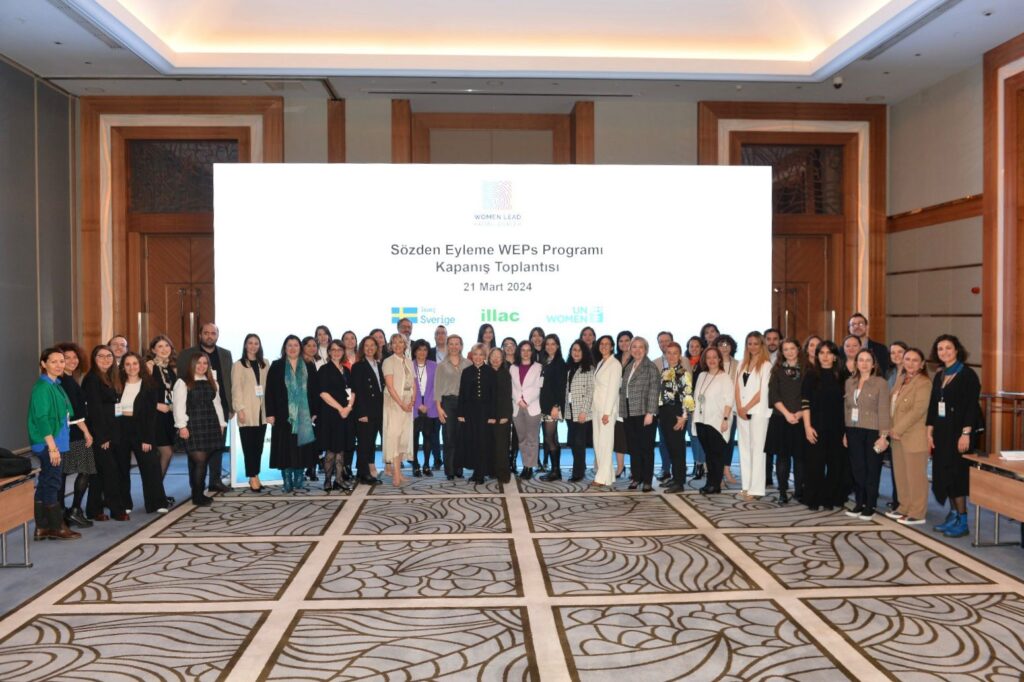

WEPs implementation brings change to Türkiye’s private sector. Photo: UN Women
Turkey’s private sector is the second largest in the world and has demonstrated leadership in this field, with 565 companies signing the Women’s Empowerment Principles (WEP) as of May 2024. The “WEPs in Action” (Sözden Eyleme WEPs) program was born out of the recognition that despite the high number of signatories, more needs to be done to deepen the implementation of WEPs within and across signatory companies.
Following a rigorous selection process that incorporated a wide range of criteria to ensure diversity across sectors, geographies, governance structures and levels of experience with WEPs, 10 companies were selected for the “WEPs in Action” program and paired with consultants for an intensive two-month WEPs implementation phase. This process enabled UN Women to assess the level of WEPs implementation, identify gaps and opportunities, and map out ways forward.
Ten participating companies (Anadolu Sigorta, Arçelik Global, Enerjisa, HepsiBurada, Inci Holding, Mavi, Migros, Şişecam, Türk Traktör, Yeşilova Holding) and four WEPs allied companies (Boyner Group, Unilever, Yeşim Group, Yıldız Holding) successfully completed the program. The closing ceremony was held in Istanbul on March 21st and was attended by senior executives, Illac Managing Director Professor Melsa Ararat and her team. Each company received a certificate of participation, shared their learnings from their experience implementing WEPs, celebrated their achievements and exchanged valuable feedback.
Asya Varbanova, UN Women Country Representative in Turkey, emphasized: “The concrete, long-term and ambitious actions towards the implementation of the WEPs by the private sector demonstrate that real commitment leads to transformative results. We would like to thank all participating companies and the WEPs Alliance for playing a key role in deepening the implementation of the WEPs within and outside our organization. We encourage more companies to not only sign the WEPs but also rigorously implement them.”
Professor Mersa Ararat added: “The WEPS in Action project is being realised to ensure that the principles do not become mere words on paper. The project focuses on designing centres of excellence as hubs of expertise, knowledge and resources to advocate and support the integration of WEPs into business strategies, policies and practices. Implementation guides and tools developed by the project team have been tested in 10 selected companies. Once implemented, the WEPs centres of excellence will provide signatories with the necessary information, tools and consultancy services, facilitating peer learning and enabling benchmarking to accelerate women’s empowerment in the workplace and society.”
A key lesson from the WEPs in Action program is that Turkey has encouraged companies to sign the WEPs. However, fully integrating these principles into corporate practices remains a challenge. Streamlining this process will require distilling experiences, standardizing best practices, and possibly offering customized service packages under UN Women’s oversight. Contributions from Turkish companies will be essential in developing a model with global relevance.
UN Women strives to ensure that all women achieve income security, decent work, economic empowerment and self-reliance. We work with various stakeholders to implement economic empowerment programmes at global, regional and national levels. We would like to express our sincere gratitude to all Turkey-based programme companies and the WEPs Alliance for their immense contributions in promoting deeper implementation of the WEPs.
The WEPs in Action programme was carried out within the scope of the project “Promoting Gender Equality and Women’s Leadership in Politics and Business”, funded by Sweden through the Swedish International Development Cooperation Agency (SIDA).
Tara Thomas Agency stands at the forefront of the entertainment industry, with years of experience dedicated to nurturing the most exceptional talents and successful acts.